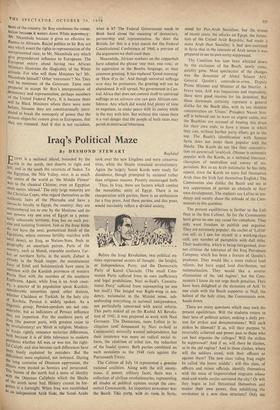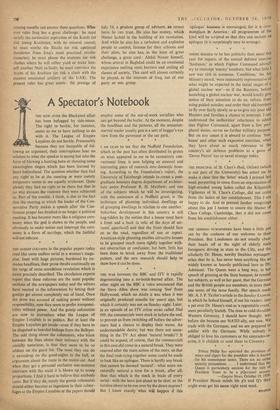Iraq's Political Maze
EGYPT is a national island, bounded by the sea in the north, two deserts to right and .left, and in the south the cataracts of Sudan. To the Egyptian, the Nile Valley, mist., is as much the centre of the world as 'the Middle Flower' was to the classical Chinese; even an Egyptian oasis seems 'abroad.' The only large minority are the Christian Copts, who regard themselves as the authentic heirs of the Pharaohs and have a farouche loyalty to Egypt, the country; they are outnumbered ten to one by the Moslems and do Ooi possess any one area of Egypt as a poten- tially schismatic territory. Iraq has no such pre- cise and isolating frontiers. Just as the Iraqi fields do not have the neat, geometrical finish of the EgYptians, where extreme fertility marches with total desert, so Iraq, as Nation-State, finds in geography an uncertain patron. Parts of the Country, such as Mosul, resemble southern Tur- key or northern Syria; in the south, Zubair is already in the Najdi steppe; the mountainous Invas of Erbil and Sulaimaniyah have more in common with the Kurdish provinces of western Persia than with the marshes of the southern Euphrates. Again, while Iraq is an Arab coun- try, a quarter of its population speak Kurdish; Considerable minorities speak other dialects, Whether Chaldean or Turkish. In the holy city Of Kerbela, Persian is widely spoken. As a linguistic group, Persian-speakers are not con- siderable, but as indicators of Persian influence they are important. For the southern parts of Iraq (the poorest parts, with greatest cause to e revolutionary) are Shiah in religion. Modern- ist Iraqis rightly renounce sectarian differences, both because it is of little relevance to modern Problems whether Ali was, or was not, the right- ful Caliph; and also because such differences have been busily exploited by outsiders. But the differences were exploited, not inVented. During the long centuries of Ottoman oppression, the Shialis were treated as heretics and persecuted. he Sunnis of the north had a sense of identity , With the Ottoman Caliphate which the Shiahs of the south never had. History cannot be for- gotten in a fortnight. When Iraq was established as au independent Arab State, the Sunni Arabs took over the new kingdom and were conserva- tives, while the Shiahs remained revolutionary. Again the largely Sunni Kurds were ready for dissidence, though prompted by national rather than religious reasons. Poverty encouraged both.
Thus, In Iraq, there are factors which combat the monolithic unity of Egypt. There is no exasperation with parties; there is an enthusiasm for a free press. And these parties, and this press, would inevitably reflect a divided society.
Before the Iraqi Revolution, two political en- tities represented sectors of thought : the Istiqlal, or Independence, Party, and the Democratic Party of Kamil Chacachi. (The small Com- munist Party suffered from its own inefficiency and legal prohibition; Nun i es-Said's 'Constitu- tional Party' suffered from representing no one but itself.) The Istiglal was Right-wing in ten- dency, nationalist in the Mizzini sense, sub- ordinating everything to national independence, not particularly concerned with social reform. This party staked all on the Rashid Ali Revolu- tion of 1941; it was prepared to work with Nazi Germany. The Democrats, more Leftist in in- clination (and denounced by Nun i es-Said as Communist), naturally wanted independence, but their insistence was more on radical social re- form, the abolition of tribal law, the reduction of the feudal system. Both parties combined on such occasions as the 1948 riots against the Portsmouth Treaty.
The Cabinet of July 14 represented a genuine national coalition. Along with the still anony- mous, if potent, military faces, there was a collection of civilian revolutionaries, representing all shades of political opinion except the com- mitted Communists. An important newcomer was the Baath. This party, with its roots in Syria, stood for Pan-Arab Socialism, but the events of recent years, the atlacks on Egypt, the forma- tion of the United Arab Republic, had made et more Arab than Socialist; it had demonstrated in Syria that in the interests of Arab union it was prepared to see its own entity suppressed.
The Coalition has now been whittled down by the exclusion of the Baath, newly come, quickly gone. Most spectacular of the changes was the demotion of Abdul Salaam Arif. General Qassim's comrade-in-arms, Deputy Prime Minister and Minister of the Interior. A brave man, Arif was loquacious and imprudent; there were good reasons for his demotion. But these dismissals certainly represent a general dislike for the Baath idea, with its too insistent concentration on 'Union.' President Nasser him- self is believed not to want an urgent union, and the Baathists are accused of beating this drum for their own mils, to have a union in which they can, without further party effort, get to the top. The Baath's identification with Sunnite Syria does not make them popular with the Shiahs. The Kurds do not like their concentra- tion on gowtniyah 'arabiyah. (Nasser is extremely popular with the Kurds, as a national liberator, champion of neutralism and enemy of im- perialism. But as an Arab nationalist he has little appeal, since the Kurds no more feel themselves Arab than the Irish feel themselves English.) The Communists also dislike the Baath and see in any suppression of parties an obstacle to their own development. The students are Leftist in ten- dency and mostly share the attitude of the Com- munists to this question.
The present equilibrium is farther to the Left than in the first Cabinet. So far the Communists have given no one any cause for complaint. They only want freedom to publish and organise. They are extremely popular; the cachet of 'Leftist' can sell, as I saw for myself in a working-class café, any number of pamphlets with dull titles. Their leadership, which is being reorganised, does not criticise the tolerance of the Iraq Petroleum Company which has been a feature of Qassim's prudence. They would like a more radical land reform, but have urged land distribution, not nationalisation. They would like a severer elimination of the 'old regime'; but the Com- munists I know do not urge death penalties. They have been delighted at the demotion of Aril. In one clash with the •Baath supporter at Nail, the holiest of the holy cities, the Communists won. hands down.
There are many questions which may rock the present equilibrium. Will the students return to their love of political action, seeking a daily pre- text for strikes and demonstrations? Will such strikes be allowed? If so, will their purpose he invariably achieved and power pass to those who can best organise the colleges? Will the strikes be suppressed? And if so, will there be clashes, as in the old regime? And in these clashes, where will the soldiers stand, with their officers or against them? The new class ruling Iraq might be called 'the lower middle': will this class, of officers and minor officials, identify themselves with the mass of impoverished migrants whose mud-and-wattle sarifas surround the city? Or will they begin to feel threatened themselves and muster their own power, thus solidifying the revolution in it new class structure? Only the coming months can answer these questions. Who- ever rules Iraq has a great challenge : he must satisfy the nationalist aspiration of the Kurds (or risk losing Kurdistan, with its mineral assets); he must soothe the Shiahs (or risk continual dissidence from Iraq's most practised revolu- tionaries); he must please the students (or risk clashes where he will either yield or make him- self mother Nun i es-Said); he must convince the Arabs of his Arabism (or risk a clash with the massive emotional artillery of the UAR). The present ruler has • great assets the prestige of July 14, a prudent group of advisers, an armed force he can trust. He also has money, which Nasser lacked in the building of his revolution. And while be also has a turbulent and explosive people to control, famous for their schisms and their plots, he also has, in the hour of great challenge, a great card : Abdul Nasser himself, whose arrival in Baghdad could be an emotional experience melting most barriers and uniting all classes of society. This card will almost certainly be played, in the interests of Iraq, not of one party or one group.



































 Previous page
Previous page